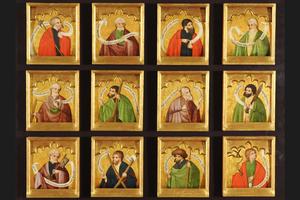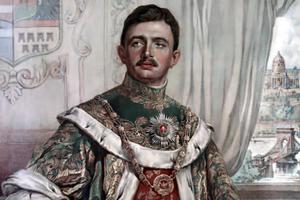Topol, Star of ‘Fiddler on the Roof,’ Dies at 87
‘Without our traditions,’ Topol’s character Tevye reminds us, ‘our lives would be as shaky as … a fiddler on the roof!’

Chaim Topol — an actor perhaps better known for the role he played, “Tevye” the milkman, in Fiddler on the Roof, died Thursday in Israel, age 87. As The New York Times’ obituary noted, some actors come to be identified with their roles: Yul Brynner as the King of Siam, Rex Harrison as Professor Henry Higgins, maybe even Patrick Stewart as Captain Jean-Luc Picard. The same can be said of Tevye … I mean Topol.
Fiddler on the Roof contains a number of religious elements. Some of them are religion refracted through an American lens, e.g., the rabbi whose primary job is telling jokes. Some stem from the nature of Judaism itself, where religion happens as much in the family hearth as the synagogue.
But those religious messages are worth some thought. I pick two.
L’chaim!
One of the memorable songs of Fiddler is “L’chaim!” — “to life!” In one sense, it’s the affirmation of the whole drama: despite all the hardships, from rural poverty to discriminatory marginalization in Czarist Russia and everything else, Tevye celebrates life. He sees life as God’s gift and part of his Providence (though he is not above asking whether a little more prosperity might “spoil some vast eternal plan”).
But we should not forget where “L’chaim” appears in the action. Tevye has just arranged a marriage for his eldest daughter, Tzeitel, with the elder Lazar Wolf. Tevye and Lazar Wolf go to the local inn to celebrate over drink. They toast “to life!” and in Tzeitel’s honor, Tevye sings:
May all your futures be pleasant ones,
Not like our present ones! …
It takes a wedding to make us say
’Let’s live another day.’
Drink, l’chaim, to life!
A wedding is a promise of life, of the future. It is an act of faith in God’s plans, both as they have been and as they will be. That is the faith heard in the ever popular song sung at Tzeitel’s wedding (to Motel Kamzoil, not Lazar Wolf):
Seedlings turn overnight to sunflowers
Blossoming even as we gaze.
How different is our world from 1964, when Fiddler opened on Broadway. In Fiddler, looking forward to marriage is natural. Tevye, as a poor father faced with dowries for daughters, worries. Golde’s “Sabbath Prayer” asks God to “make [them] good mothers and wives … may he send you husbands who will care for you.” The girls have dreams (and nightmares) about the “match” Yente might bring them.
In our day, marriage is deferred if not rejected. Indeed, marriage versus multiple variations — some more, some less permanent — abound, yet today’s people of marriageable age seem not too interested in any of them. Some even call marriage a “capstone,” something more a resume-crowning achievement than a natural order of things.
And, as much as marriage is declining so, too, is parenthood. Children are seen more as burdens than blessings. Our populations age and shrink.
Unlike Tevye, L’chaim seems not to be our song.
Divine Providence
Tevye sees life as part of God’s “vast eternal plan.” He might quibble about how he thinks that plan could be better but, in the end, it’s not even about temporal things.
In “If I Were a Rich Man,” Tevye enumerates the nice things he might have. He “wouldn’t have to work hard.” People might even consult with him, as if his opinion mattered. Tevye walks solidly enough on the earth to know “it won’t make one bit of difference if I answer right or wrong. … When you’re rich, they think you really know!” But, after he considers all the things money might bring, his ultimate aspiration — “the sweetest thing of all” — is to “sit in the synagogue and pray” and “to discuss the holy books … several hours a day.”
But God has “decreed I should be what I am,” and Tevye accepts it. He makes his way through life as best as he can with the cards he’s been dealt. And he relies on God to lead him. Even when he learns, just before his daughter’s wedding, that a pogrom may be imminent, he complains to God — and accepts his will: “I know we are your chosen people. But once in a while can’t you choose someone else?”
To Life … Eternal!
In its day, Fiddler created for Americans and other Westerners an image of a lost world. The world of the Jewish shtetls of Central and Eastern Europe ended in the Holocaust. And the palatable milkman of 1964 was not the Jewish immigrant Americans (or even American Jews) wanted to welcome at the turn of the 20th century — they wanted assimilated Rosenkrantzes from Germany, not Orthodox Tevyes from Russia. Still, Fiddler opened something of a window to that lost world, including the faith that animated those unassimilated elder brothers.
Tevye asked God why he couldn’t be “a rich man.” Let us pray that the Lord reveals to Topol the rich life he brought others and conducts him to life … eternal.
- Keywords:
- fiddler on the roof
- tradition
- films
- musicals
- deaths

















